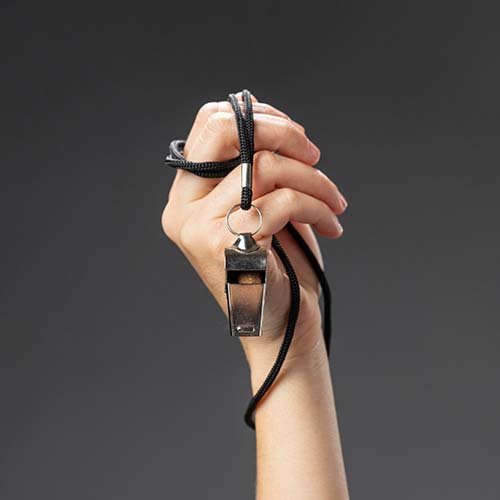View Transcript
== Sample ==
- [1:32] – Dereck shares his background in sports and through these sports he found that later he already had the foundations for pickleball.
- [2:27] – His entry into pickleball was an amusing experience as Dereck found a new rec center near his home.
- [3:31] – After going to a pickleball class in 2017, Dereck describes himself as an all-around pickleball addict now.
With recent rule changes, refereeing is not an easy job. There are so many rules to remember and as our guest today describes it, you have to have them at your fingertips without a second thought. In today’s episode, our guest is the incredible referee, Dereck Prince.
Dereck is a former table tennis, badminton, and tennis player turned “pickleball addict.” He is also a data analyst, IPTPA Certified Teaching Professional, USAPA Certified Referee, and USAPA Registered Pickleball Referee Trainer. His passion for the game and skills as a referee have landed him for two years as the referee of gold medal matches at the US Open.
Today, Dereck and I discuss his experience as a referee, some of the 2021 rule changes, and he offers tips to players like you who are playing recreationally or considering a tournament. This will certainly not be the last time I have Dereck on the show so stay tuned for more from today’s knowledgeable guest.
“Reffing the US Open is an experience like no other. To be there on center court, to have the best players in the world going at it, it is enthralling to watch them.” - Dereck Prince Share on X
Refereeing
Lorem ipsum dolor sit amet, consectetur adipiscing elit. Sed laoreet, ligula id fermentum lacinia, ipsum lorem mollis neque, non porta libero eros quis ante. In nulla dolor, eleifend et massa vitae, lobortis interdum nunc. Donec ut enim congue ipsum finibus vehicular.
– Dereck Prince
Show Notes:
- [1:32] – Dereck shares his background in sports and through these sports he found that later he already had the foundations for pickleball.
- [2:27] – His entry into pickleball was an amusing experience as Dereck found a new rec center near his home.
- [3:31] – After going to a pickleball class in 2017, Dereck describes himself as an all-around pickleball addict now.
- [4:40] – Dereck describes how he decided he wanted to referee.
- [6:14] – Dereck shares a humorous story of his first refereeing experience. His mistakes motivated him to learn more and eventually seek certification.
- [7:35] – Something a lot of people don’t know is that Dereck failed the certification test the first time he took it.
- [9:20] – In 2019, Dereck reffed the US Open in gold medal matches. He describes it as a little nerve-wracking, but he did well and was asked to ref again just last month for the 2021 US Open.
- [11:17] – Dereck explains how he learned of the honor of reffing gold medal matches.
- [13:11] – “It’s never the same. It could be the same players but situations always arise that challenge you to have to scurry your brain for the applicable rule and apply it there on the spot.” – Dereck Prince
- [14:01] – Knowing all the rules at a moment’s notice is a challenge because Trey points out that rules change in this game often.
- [15:06] – Trey and Dereck discuss drop serves and the provisional rule change to allow anyone to use it.
- [16:37] – Referees have to closely watch serves and Dereck compares some of the serves to those in tennis and why they are not all allowed.
- [17:58] – Footfalls on the kitchen line still continue to be the single biggest problem in rec play and some tournament play. Without a referee, it is near impossible to monitor.
- [19:30] – Dereck explains how a lot of people try too hard to impart spin in the ball through a drop serve.
- [21:30] – Regarding the recent 2021 rules changes, Dereck describes some of the changes that have had negative reactions from referees.
- [23:25] – Dereck has had the unfortunate experience of ending a match over a rule change that is difficult to adhere to.
- [25:09] – If the wrong score is called, players have until the third shot to stop play. Dereck explains why players should play through completion and correct scores after.
- [26:13] – Dereck describes a problematic rule in which a player must see a space between the line and the ball before they can call the ball out.
- [27:37] – Referees are impartial and do not engage in verbal confrontation with players.
- [29:29] – Referees make sure that matches are “clean” and without profanity on the court. They can issue one verbal warning per game and if after that, profanity can then warrant a technical warning or fault.
- [31:20] – If you serve the ball prior to the referee calling the score completely, it is not a fault. It is simply a reserve.
- [32:27] – Technical faults can also be given for abusive or damaging behavior.
- [34:24] – What happens when you ask a referee a question? Dereck illustrates when and how this should happen appropriately.
- [36:37] – Dereck shares a pet peeve of his when notifying players of time left.
- [38:39] – Trey and Dereck describe the difference between recreational play and tournaments.
- [40:24] – Use the time-outs available to you and use the full minute before getting back on court.
- [41:19] – If you are not familiar with stacking and switching, Dereck advises not to do it during a tournament because there is no forgiveness.
- [42:12] – Dereck recommends to get used to using server bands during recreational play because in tournaments, that is what referees look at.
- [44:08] – There is one rule book that governs rec play and tournament play. Many times you will hear the comment that it is just rec play. That is not right. The rules are the rules and they apply to both.



